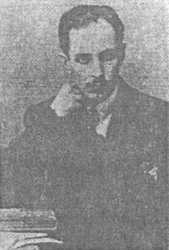Mirzadeh Eshghi

Mirzadeh Eshghi or Eshqi (Persian: میرزاده عشقی), born Sayed Mohammad Reza Kordestani (1893 - July 3, 1924), was a political writer and poet of Iran.
Biography
He was born in Hamadan, the son of Hajj Sayed Abolghasam Kordestani; he learned French in the Ecole d'Alliance, and moved to Istanbul for a while. He is particularly famous for writing the opera Rastakhiz Iran (Resurrected Iran), which was a reflection of his patriotic spirit.
After returning to Iran and spending time with his family in Tehran, he published newspapers in which he fiercely attacked the political system of Iran. He is remembered for writing six plays; his Noruz nameh is particularly famous. He also published a paper called Twentieth Century and predicted his early death repeatedly.[1]
Death
Eshghi was murdered by two unknown gunmen in his house in Tehran.[2][3] He was buried in Ebn-e Babooyeh cemetery in Shahr-e Ray, near Tehran.[4]
Works
- Plays
- Operay-e-Rastakhiz-e-Mehr-e-Yaran (Written in Istanbul)
- Kafan-e-Siah or Black Shroud (Written in Tehran)
- Resurrected Iranian Kings (Written in Istanbul)
Poetry sample
The poem "one must shit" is one of his fieriest and most famous works where he severely criticizes the political environment of the time in a very harsh language. Here is the first few lines of the poem.
After this, on the homeland and its territory one must shit. On such parliament and all its glory one must shit.
If the path to justice is really through the doors of these courts, on such justice and on their walls and doors one must shit.
The one who has sank Iran up to her waste in feces, in revenge on him up to his waste one must shit.
The father of the Iranian nation if is this fatherless, on such nation and the soul of its father one must shit.
References
- ↑ Aryanpour, Yahya (1993). 150 Years History Of Persian Literature 2. Zavvar Publications. p. 364.
- ↑ Zabih, Sepehr (September 1982). "Aspects of Terrorism in Iran". Annals of the American Academy of Political and Social Science. International Terrorism (Sage Publications) 463: 84–94. Retrieved 28 July 2013.
- ↑ Aryanpour, Yahya (1993). 150 Years History Of Persian Literature 2. Zavvar Publications. pp. 364–365.
- ↑ Photograph of Eshghi's gravestone:
|
| |||||||||||||||||||||||||||||||||||
